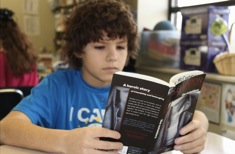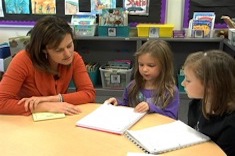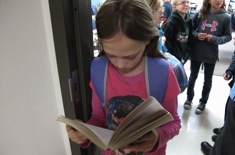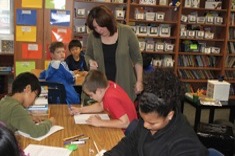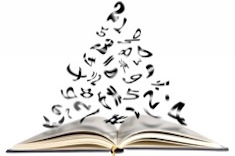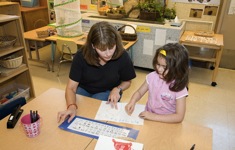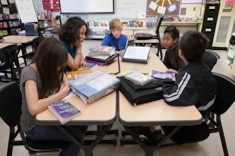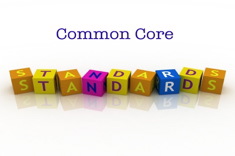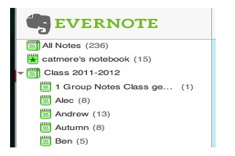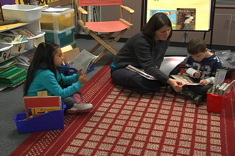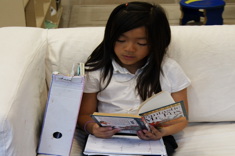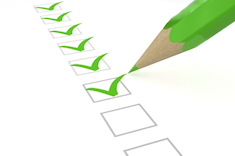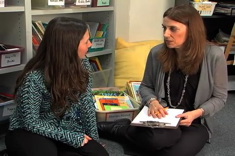Assessment Tools
Making sense of the enormous amount of student data in any classroom or school is probably the biggest challenge we face individually and in our school communities. Here you'll find everything from one-page templates created by teachers for use in their classrooms to videos of staff teams poring over large data sets. We don't have all the answers, but we do provide tools to help you ask better questions as you evaluate students and talk about assessments with your colleagues.
Latest Content
October Literacy Contracts: Fear and Conflict
Megan Ginther and Holly Mueller continue their monthly series on using literacy contracts in middle school. The October literacy contracts have a theme of fear and conflict.
Kidwatching and Connections in the Early Days
Cathy Mere finds the early days of school are all about kidwatching and connecting with her first-grade students during reading and writing workshops. She shares some terrific guiding questions that might also help new teachers hone their observation skills.
Emphasizing Empathy: September Literacy Contracts
Megan Ginther and Holly Mueller are Emphasizing Empathy in their September literacy contracts for middle school students.
Literacy Contracts: Introduction
Megan Ginther and Holly Mueller present Reading Contracts, a system for middle and high school teachers that involves students contracting to complete specific texts and tasks each month.
The Cure for Value-Added Grief? Teacher Research
Gretchen Taylor goes through the stages of "value-added grief" when her sixth-grade team receives disappointing test scores from the state. Teacher research helps her find joy again in her classroom, as well as some useful strategies for helping a group of struggling readers.
Notebooks, Goals, and Writing About Characters in First Grade
Katie DiCesare confers with a group of first graders about their writing notebooks, goals, and drafts about the characters they are studying during reading workshop.
What Data Will You Be Collecting?
Tony Keefer explains why attitudinal survey data is important to collect early in the year, and shares different reading surveys he uses with students to understand their needs in the first six weeks of school.
Rethinking the Assessment Binder
Franki Sibberson’s dilemma? How to file every evaluation so it is organized and accessible (since she never knows when someone might ask for it), while still finding a way to keep the assessments she needs every day at her fingertips.
Reflecting All Year Long
Katherine Sokolowski finds the impulse for reflection is strong at the start of summer, but reflection works best when it’s built into routines all year long.
Independent Reading By the Numbers Is NOT Text Complexity
How do you guide students to select books for independent summer reading? Aimee Buckner challenges teachers who are requiring middle students to pick books based solely on Lexile scores.
Three Ways to Build Purpose in a Preschool Reading Workshop
Melissa Kolb finds her three- and four-year-old students are ready for more focus during reading time.
Assessing Learning During Student-Led Book Clubs
When middle school students have choice and independence in book clubs they lead themselves, how do you assess their learning and thinking? Katie Doherty provides a variety of question prompts she uses with groups to spark reflection on learning.
Eyes on the Fries: Just-Right Books and Reading Peer Pressure in Middle School
Gretchen Taylor addresses the issue of "peer-pressured reading" in middle school reading workshops, with a practical example of how she helped her students move beyond the fad book of the moment to more thoughtful previewing and independent reading choices.
New Year Goals (Part 2)
Choice Literacy contributors share their New Year goals. This is the second installment in a two-part series.
Rethinking Mrs. T Letters
Karen Terlecky reconsiders one of her favorite writing assignments.
Value-Added: Moving Assessments from “Inflicted” to “Student-Owned”
Gretchen Taylor looks closely at the superficial reading responses of one student, and then uses a mid-year assessment to challenge all of her middle school readers to think, talk, and write more deeply about their reading.
Evaluating the Literacy Classroom
Jennifer Schwanke remembers the awkward and stressful experience of being evaluated as a young teacher. In her work now as a principal, she’s developed her own criteria for evaluating teachers.
Revising My Recording Form for Writing Conferences
Mandy Robek shares how she has revised the records she keeps during writing conferences.
On Perfection and Goals
Ruth Ayres explains how she sets realistic goals for her own learning during the year.
Helping Middle School Readers Set Goals
In the final installment of a two-part series, Gretchen Taylor explains how to help middle school readers set goals.
Running and Middle School Reading Goals
Gretchen Taylor helps her middle school students analyze their needs as readers and set benchmarks for growth.
Introducing the Common Core Standards in Writing (Part 2)
Heather Rader shares more guidelines for a professional development day on the Common Core with a writing focus.
Tried and True Trumps Shiny and New
Amanda Adrian explains why running records are still an essential tool in any teacher’s assessment arsenal. She also includes links to web resources for honing your running record skills if they are a bit rusty.
Capturing Student Learning with Evernote
It can be difficult to move from print to electronic records in the classroom. After using a spiral notebook for 10 years, Cathy Mere did just that.
How Do We Know Small-Group Instruction is Effective?
Heather Rader considers how to assess the effectiveness of groups.
Assessing Gifted Readers
Michelle Kelly has an unique problem: what to do with readers who already exceed the standard. With grace and good instruction in mind, she considers alternative assessments.
Coaching for the Test
Two teachers are disappointed in student assessment results, but they have very different approaches to tackling the problem. Heather Rader shares her role as a mentor in assisting her colleagues.
Spring Reading Interviews (TEMPLATE)
Kindergartners may be too young for reading interviews early in the fall, but Mandy Robek finds spring reading interviews are an excellent bridge to families and summer reading suggestions.
Coaching Monkey
Heather Rader has advice for literacy coaches looking for honest appraisals of their work from colleagues.
Transitioning to Guide on the Side: Facilitating Collaborative Scoring
Heather Rader wants to transition to more of a guide-on-the-side role as she coaches colleagues. Here are some simple strategies she uses to move offstage during collaborative scoring workshops.
Browse Content By
Type
Category
- Assessment Tools
- Big Fresh Archives
- Booklists
- Choice Numeracy
- Classroom Design
- Common Core
- Community Building
- Conferring
- Content Literacy
- Digital Literacy
- English Language Learners
- Equity
- Family Relations
- Free Samples
- Guiding Groups
- Leadership
- Literacy Coaches
- Mentor Texts
- Minilessons
- New Teacher Mentors
- Podcasts
- Poetry
- Quote Collections
- Reading Strategies
- Self Care
- Struggling and Striving Learners
- Talking and Listening
- Teacher Study Groups
- Teaching Reading
- Teaching Writing
- Word Study and Vocabulary
Author
- Melissa Quimby
- Nawal Qarooni
- Gwen Blumberg
- Julie Cox
- The Lead Learners
- Hannah Tills
- Josie Stewart
- Ruth Metcalfe
- Mallory Messenger
- Becca Burk
- Jodie Bailey
- Vivian Chen
- Mary Brower
- Tiffany Abbott Fuller
- Stephanie Affinito
- Ruth Ayres
- Leigh Anne Eck
- Heather Fisher
- Shari Frost
- Julie Johnson
- Suzy Kaback
- Gigi McAllister
- Shirl McPhillips
- Melanie Meehan
- Cathy Mere
- Debbie Miller
- Tara Barnett and Kate Mills
- Tammy Mulligan
- Dana Murphy
- Bitsy Parks
- David Pittman
- Brenda Power
- Heather Rader
- Matt Renwick
- Mandy Robek
- Christy Rush-Levine
- Gretchen Schroeder
- Jen Schwanke
- Brian Sepe
- Katherine Sokolowski
- Stella Villalba
- Jennifer Vincent
Grade Level
Choice Literacy Membership
Articles
Get full access to all Choice Literacy article content
Videos
Get full access to all Choice Literacy video content
Courses
Access Choice Literacy course curriculum and training





